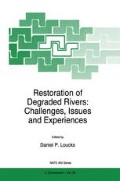Abstract
Problems of riverine rehabilitation face many nations which are, at the same time, undergoing rapid economic and political transition. Very bad conditions have accumulated over many years, but budgets are very tightly constrained. Thus it is important to design rehabilitation strategies that will produce the greatest improvement per unit of expenditure. This raises the question of what one may mean by “greatest improvement.” This will be addressed in later sections of this paper.
Access this chapter
Tax calculation will be finalised at checkout
Purchases are for personal use only
Preview
Unable to display preview. Download preview PDF.
References
Howe, Charles W. (1993), “The U. S. environmental policy experience: A critique with suggestions for the European community,” Environmental and Resource Economics 3, 359–379.
Johnson, Ralph W. and Brown, Jr., Gardner M. (1976), Cleaning up Europe’s Waters: Economics Management and Policies, Prager Publishers, New York.
Kneese, Allen V. (1964), The Economics of Regional Water Quality Management, Resources for the Future, Inc., John Hopkins Press, Baltimore.
Linsley, Ray K., Franzini, Joseph B., Freyberg, David L. and Tchobanoglous, George (1992), Water Resources Engineering ( 4th ed. ), McGraw-Hill, Inc. New York.
O’Neil, William B. (1983), “The regulation of water pollution permit trading under conditions of varying streamflow and temperature,” in Erhard F. Joeres and Martin H. David (eds.), Buying A Better Environment: Cost-Effective Regulation Through Permit Trading, The University of Wisconsin Press, Madison
Portney, Paul R. (ed.) (1990), Public Policies for Environmental Protection, Resources for the Future, Inc., Washington, D.C.
Author information
Authors and Affiliations
Editor information
Editors and Affiliations
Rights and permissions
Copyright information
© 1998 Springer Science+Business Media Dordrecht
About this chapter
Cite this chapter
Howe, C.W., Carmichael, J.J. (1998). Guidelines for Riverine Water Quality Rehabilitation and Management During Economic Transition: Institutions, Economics and Alternative Strategies. In: Loucks, D.P. (eds) Restoration of Degraded Rivers: Challenges, Issues and Experiences. NATO ASI Series, vol 39. Springer, Dordrecht. https://doi.org/10.1007/978-94-017-2894-2_23
Download citation
DOI: https://doi.org/10.1007/978-94-017-2894-2_23
Publisher Name: Springer, Dordrecht
Print ISBN: 978-90-481-4991-9
Online ISBN: 978-94-017-2894-2
eBook Packages: Springer Book Archive

